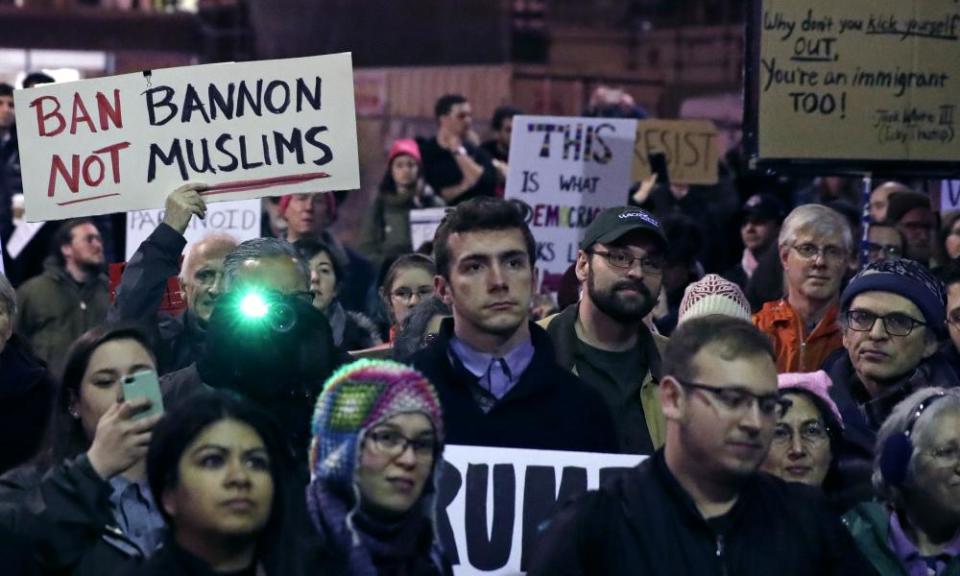If the US supreme court upholds the Muslim ban, we will need civil resistance | Rob Hunter

The US supreme court announced on Monday that it will decide on the legality of Donald Trump’s travel ban. It also partially stayed injunctions against the ban, meaning that the administration can impose 90-day bans on people traveling from six predominantly Muslim countries (unless they have a “bona fide relationship” with someone in the US), and that it can bar refugees from entering the US for up to 120 days.
It’s likely that the court will eventually uphold all or part of the ban as an appropriate exercise of the president’s powers. Only mass confrontational politics can prevent that from happening, or undo it if it does happen.
It was direct action, not legal argument, that stopped the administration from implementing the travel ban in its entirety earlier this year. The original ban quickly faced stiff protest in January. Rapid mass mobilization, combined with the organizing skills of activists and immigration advocates, produced the thrilling spectacle of large-scale direct action in some of the most heavily policed spaces in the country: airports.
Federal judges responded to the pressure by issuing orders blocking removals under the ban, and later preventing enforcement of the ban’s provisions. Injunctions were also later issued against a revised ban that was reworded to be less transparently Islamophobic.
This was only a partial and temporary victory, but it was nevertheless a palpable one. Refugee advocates and immigration lawyers played their parts in the legal battle, but ultimately the speed and consistency with which federal judges issued their rulings resulted from the pressure that mass action placed upon the courts.
The experience of the protests against the ban taught some important lessons. First, democratic values are not self-enforcing; they must be manifested through collective action. Second, contestation, not conciliation, is the core of democratic politics.
The people who occupied airport terminals, braving harassment and arrest by the police, did not seek to persuade the administration to abandon the ban. Instead, they mobilized to exert pressure on public institutions. They sought to force decision-makers to make a basic democratic decision: to halt the ban, or to risk a confrontation with widespread public anger.
We need to make this pressure felt again. It is more important than ever to form coalitions among organizations, to forge stronger bonds of solidarity, and to build the social movement power of Muslims, refugees, and immigrants. These are the requirements of a democratic politics that can push back against the ban, against official Islamophobia, and against the racism that structures so much of American society.
The stakes are high, but so are the hurdles. The justices are likely to be deferential to the administration’s constitutional claims. Presidential powers with respect to immigration have usually been understood in expansive terms (although the precise contours of those powers remain contested).
The terrain of conflict has also shifted. Instead of a contest between the administration and the street, the battle over the ban will now take place within the realm of jurisprudence.
Many Americans profess a faith in the integrity of the supreme court, believing that constitutional law is a separate sphere of public life. This faith is misplaced. The justices are not neutral “umpires” (Chief Justice Roberts’ term) that are above politics; nor could they be. Law, including judicial review, is an instrumentality of state power.
It is true that the court’s decisions have occasionally delivered modest gains to progressive movements (most notably during the middle of the twentieth century). Such decisions were infrequent, though, and were only made possible by the profound pressure that mass movements — the Civil Rights Movement in particular — placed upon the court. Historically, the court has not been a friend to progressive causes, from the fight against slavery, to the struggle for labor rights, to efforts to construct a robust welfare state.
The fight against the ban, then, requires not just the embrace of contestatory politics but also a critical examination of the court’s function in politics. The court is not a forum of principled deliberation where the best arguments prevail. It is a political institution where elites try to entrench their positions, through the appointment of ideologically friendly justices.
It would be a mistake to fight the ban through the subtleties of constitutional interpretation, a game in which almost any conceivable move may be made but where the winning moves tend to be backed by political power. Nor should a decision to uphold the ban be regarded as final defeat, since the justices only hold themselves to be bound by precedent until they decide they are not bound by it — or until legislation compels them otherwise.
Only a mass movement will successfully fight the ban. That movement must articulate an antiracist politics of solidarity and collective struggle, and it must deny the administration and the courts room for maneuver through mass action.

 Yahoo News
Yahoo News 